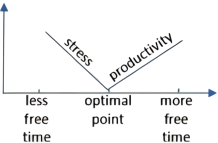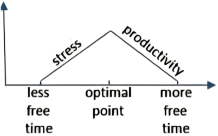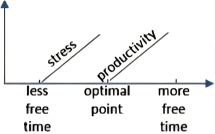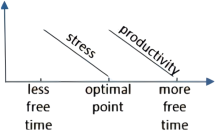1 . Up and down the economic ladder, many Americans who work—and especially those raising kids—are pressed for time, wishing they had more of it to devote to leisure activities (or even just sleeping). At the same time, research has indicated that people who are busy tend to be happier than those who are idle, whether their busyness is purposeful or not.
A research paper released late last year investigated this trade-off, attempting to pinpoint (精确指出) how much leisure time is best. Its authors examined the relationship between the amount of “discretionary time” people had—basically, how much time people spend awake and doing what they want—and how pleased they were with their lives.
The paper, which analyzed data covering about 35,000 Americans, found that employed people’s ratings of their satisfaction with life peaked when they had in the neighborhood of two and a half hours of free time a day. For people who didn’t work, the optimal (最佳) amount was four hours and 45 minutes.
The research traced a correlation (关联) between free time and life satisfaction, but didn’t provide any definitive (最后的) insight into what underlies that correlation—“which is exciting, because this is a work in progress,” says Cassie Mogilner Holmes, a professor at UCLA’s Anderson School of Management and a co-author of the paper, which hasn’t yet been peer-reviewed or published in an academic journal.
An experiment that the researchers arranged hinted at (暗示) a possible explanation of the correlation they found. They asked participants to picture and describe what it would be like to have a certain amount of daily free time, and then report how they’d feel about that allotment (分配). “What we find is that having too little time makes people feel stressed, and maybe that’s obvious,” says Holmes. “But interestingly, that effect goes away—the role of stress goes away—once you approach the optimal point.” After that point, Holmes says, the subjects started to say they felt less productive overall, which could explain why having a lot of free time can feel like having too much free time.
It’s not clear what an individual is to do with these findings, since the amount of free time people have usually has something to do with a variety of factors, such as having children or a degree of control over work schedules. Holmes shared her research with the MBA students in her class on happiness, and some of the most time-crunched among them were comforted by the findings: “I think that two and a half hours creates a nice goal that even if you increase a little bit more of your discretionary time use, you can expect that it will translate into greater life satisfaction.”
1. According to the passage, what happens to Americans occupied with their work?| A.They allow themselves more leisure time. |
| B.They keep themselves busy on purpose. |
| C.They know how much leisure time is best. |
| D.They experience higher level of satisfaction. |
| A.Researchers have cast light on the cause of the correlation. |
| B.Unemployed people need more leisure time to feel content. |
| C.The paper on the correlation has achieved peer recognition. |
| D.Employed people enjoy more leisure time in the neighborhood. |
A. | B. |
C. | D. |
| A.Holmes is optimistic about the influence of her findings |
| B.individuals are encouraged to control their work schedules |
| C.people with tight schedules can’t benefit from the findings |
| D.the MBA students find no free time to obtain life satisfaction |
2 . You often can choose a private setting when you browse(浏览) the internet. But be forewarned: It may not afford nearly as much privacy as you expect. That’s the finding of a new study.
Major web browsers, such as Google’s Chrome and Apple’s Safari, often a private-browsing option. It’s sometimes referred to as “incognito.” This option lets you surf the Internet browser and saves a record into its history of each page that you visited. And what sites you visit won’t affect the suggestions your browser makes the next time you’re filling out an online form.
Many people believe----incorrectly--- that the incognito setting protects them more broadly. Most believe it even after reading a web browser’s explanation of the incognito mode.
For instance, a new study had 460 people read web browsers’ descriptions of private browsing. Each person read one of 13 descriptions. Then the participants answered questions about how private they thought their browsing would be while using this tool. The volunteers didn’t understand the incognito mode.This was true no matter which browser explanation they had read. The researchers reported their findings on April 26 at the 2018 World Wide Web Conference in Lyon, France.
More than half of the volunteers thought that if they logged into a Google account through a private window, Google wouldn’t keep a record of their search history. Not true. And about one in every four participants thought private browsing hid their device’s IP address. That’s wrong, too.
Blase Ur was one of the study’s authors. He’s an expert in computer security and privacy in Illinois at the University of Chicago. Companies could clear up this confusion by giving better explanations of the incognito mode, his team says. For example, the browsers should avoid vague(模糊).The web browser Opera, for instance, promises users that “your secrets are safe.” Nope Firefox encourages users to “browse like no one’s watching.” In fact, someone might be. (If you’d like to know more about the research information, please click here .)
1. The researchers did the study with the aim of ______.| A.checking the safety of browsers of leading companies |
| B.finding users’ knowledge about private browsing policy |
| C.tracking young web users’ browsing habits |
| D.testing a new tool to judge the Internet |
| A.record one’s passwords |
| B.give a warning of insecure links |
| C.help hide one’s past browsing history |
| D.access one’s favorite websites quickly |
| A.a text book | B.a newspaper |
| C.a magazine | D.the Internet |
| A.report a new finding | B.put forward a suggestion |
| C.introduce a web browser | D.correct a misunderstanding |
3 . More than loo genes are related with increased risk of developing schizophrenia (精神分裂症), bipolar disorder (躁郁症) and alcoholism (酗酒), confirms a large study published in the recent issue of the British scientific journal Nature.
The world’s largest study into the genetic basis of mental illnesses was led by researchers from British universities, including University College London (UCL), Cardiff University and King's College London (KCL).
Researchers believe that they are now much closer than before to understanding the complex biological causes, which make some people being at high risk of developing mental illnesses. They also believe that these findings could lead to new treatments.
The researchers analyzed the DNA of about 37,000 patients with schizophrenia, bipolar disorder or alcoholism, and compared the smallest genetic changes to those found in about 113,000 healthy people. They then identified about 128 independent genetic variants (变体) at 108 locations on the human chromosomes (染色体) that contribute significantly to developing schizophrenia — 83 of these sites have never before been linked to the illness, according to scientists.
For example, people with the variant of the GRM3 gene, thought to be important in brain signaling, are around 2 to 3 times more likely to develop schizophrenia or alcohol dependence. The variant, which is found in approximately one in every 200 people, is also associated with a three times risk of developing bipolar disorder.
“We could be looking at the next big drug target for treating mental illness,” Professor David Curtis from UCL, co-author of the paper, said. “The work opens up new ways to prevent and treat mental illnesses by revealing the mechanisms involved in their development.”
1. What can we learn from Paragraph 3?| A.Researchers are disappointed at curing biological causes. |
| B.Researchers are worried about the complex biological causes. |
| C.Researchers have found the method of curing biological causes. |
| D.Researchers are confident for figuring out the complex biological causes. |
| A.there are 37,000 patients with mental illnesses in the world |
| B.most of the sites have never before been linked to mental illnesses |
| C.there is little difference between the patients and the healthy people |
| D.the cause of mental illnesses has nothing to do with the genetic changes |
| A.the variant of the GRM3 gene is important |
| B.the number of people with the variant of the GRM3 gene is large |
| C.the number of people with the variant of the GRM3 gene is small |
| D.people with the variant of the GRM3 gene aren’t likely to suffer schizophrenia |
| A.The importance of gene variants. |
| B.The research of gene variants. |
| C.The cause of mental illnesses. |
| D.Gene variants linked to mental illnesses. |
4 . For a long time Gabriel didn’t want to be involved in music at all. In his first years of high school, Gabriel would look pityingly at music students,
This
| A.travelling | B.marching | C.pacing | D.struggling |
| A.rising up | B.coming up | C.driving up | D.turning up |
| A.before | B.after | C.until | D.since |
| A.betray | B.accept | C.avoid | D.appreciate |
| A.Therefore | B.However | C.Thus | D.Moreover |
| A.part | B.nature | C.basis | D.spirit |
| A.complicated | B.safe | C.confusing | D.easy |
| A.missed | B.disliked | C.enjoyed | D.denied |
| A.transparent | B.obvious | C.false | D.similar |
| A.run | B.jogged | C.jumped | D.wandered |
| A.because | B.but | C.though | D.so |
| A.ear | B.taste | C.heart | D.voice |
| A.occurred to | B.took to | C.appealed to | D.held to |
| A.change | B.chance | C.mission | D.function |
| A.seriously | B.proudly | C.casually | D.naturally |
| A.committed | B.used | C.limited | D.admitted |
| A.proved | B.showed | C.stressed | D.meant |
| A.pushing | B.dragging | C.lifting | D.rushing |
| A.admiring | B.pitying | C.annoying | D.teasing |
| A.over | B.aside | C.behind | D.out |
5 . Hollywood’s theory that machines with evil(邪恶) minds will drive armies of killer robots is just silly. The real problem relates to the possibility that artificial intelligence(AI) may become extremely good at achieving something other than what we really want. In 1960 a well-known mathematician Norbert Wiener, who founded the field of cybernetics(控制论), put it this way: “If we use, to achieve our purposes, a mechanical agency with whose operation we cannot effectively interfere(干预), we had better be quite sure that the purpose put into the machine is the purpose which we really desire.”
A machine with a specific purpose has another quality, one that we usually associate with living things: a wish to preserve its own existence. For the machine, this quality is not in-born, nor is it something introduced by humans; it is a logical consequence of the simple fact that the machine cannot achieve its original purpose if it is dead. So if we send out a robot with the single instruction of fetching coffee, it will have a strong desire to secure success by disabling its own off switch or even killing anyone who might interfere with its task. If we are not careful, then, we could face a kind of global chess match against very determined, super intelligent machines whose objectives conflict with our own, with the real world as the chessboard.
The possibility of entering into and losing such a match should concentrate the minds of computer scientists. Some researchers argue that we can seal the machines inside a kind of firewall, using them to answer difficult questions but never allowing them to affect the real world. Unfortunately, that plan seems unlikely to work: we have yet to invent a firewall that is secure against ordinary humans, let alone super intelligent machines.
Solving the safety problem well enough to move forward in AI seems to be possible but not easy. There are probably decades in which to plan for the arrival of super intelligent machines. But the problem should not be dismissed out of hand, as it has been by some AI researchers. Some argue that humans and machines can coexist as long as they work in teams—yet that is not possible unless machines share the goals of humans. Others say we can just “switch them off” as if super intelligent machines are too stupid to think of that possibility. Still others think that super intelligent AI will never happen. On September 11, 1933, famous physicist Ernest Rutherford stated, with confidence, “Anyone who expects a source of power in the transformation of these atoms is talking moonshine.” However, on September 12, 1933, physicist Leo Szilard invented the neutron-induced(中子诱导) nuclear chain reaction.
1. Paragraph 1 mainly tells us that artificial intelligence may .| A.run out of human control |
| B.satisfy human’s real desires |
| C.command armies of killer robots |
| D.work faster than a mathematician |
| A.prevent themselves from being destroyed |
| B.achieve their original goals independently |
| C.do anything successfully with given orders |
| D.beat humans in international chess matches |
| A.help super intelligent machines work better |
| B.be secure against evil human beings |
| C.keep machines from being harmed |
| D.avoid robots’ affecting the world |
| A.It will disappear with the development of AI. |
| B.It will get worse with human interference. |
| C.It will be solved but with difficulty. |
| D.It will stay for a decade. |
6 . We all know that some things are obviously right. For example, it is right to be
Rules can help the public make the right
If people follow rules without taking other matters into consideration, it will be
Sometimes it may not be so easy to know
| A.kind | B.sensitive | C.fair | D.generous |
| A.equally | B.slightly | C.clearly | D.increasingly |
| A.suggestion | B.conclusions | C.turns | D.choices |
| A.accidents | B.mistakes | C.falls | D.deaths |
| A.interesting | B.vital | C.easy | D.valuable |
| A.seldom | B.rarely | C.merely | D.never |
| A.trouble | B.power | C.prison | D.control |
| A.roughly | B.eventually | C.deliberately | D.exactly |
| A.awful | B.cruel | C.unhealthy | D.unnecessary |
| A.still | B.even | C.later | D.somehow |
| A.nervous | B.anxious | C.afraid | D.guilty |
| A.begging | B.starving | C.growing | D.wandering |
| A.follow | B.instruct | C.treat | D.protect |
| A.disgusting | B.confusing | C.unsafe | D.unimportant |
| A.predict | B.explain | C.decide | D.consider |
7 . Facial expressions carry meaning that is determined by situations and relationships. For example, in American culture (文化) the smile is in general an expression of pleasure. Yet it also has other uses. A woman’s smile at a police officer does not carry the same meaning as the smile she gives to a young child. A smile may show love or politeness. It can also hide true feelings. It often causes confusion (困惑) across cultures. For example, many people in Russia consider smiling at strangers in public to be unusual and even improper. Yet many Americans smile freely at strangers in public places (although this is less common in big cities).Some Russians believe that Americans smile in the wrong places; some Americans believe that Russians don’t smile enough. In Southeast Asian cultures, a smile is frequently used to cover painful feelings. Vietnamese people may tell a sad story but end the story with a smile.
Our faces show emotions (情感), but we should not attempt to "read" people from another culture as we would "read" someone from our own culture. The fact that members of one culture do not express their emotions as openly as do members of another does not mean that they do not experience emotions.
Rather, there are cultural differences in the amount of facial expressions permitted. For example, in public and in formal situations many Japanese do not show their emotions as freely as Americans do. When with friends, Japanese and Americans seem to show their emotions similarly.
It is difficult to generalize about Americans and facial expressiveness because of personal and cultural differences in the United States. People from certain cultural backgrounds in the United States seem to be more facially expressive than others. The key is to try not to judge people whose ways of showing emotion are different. If we judge according to our own cultural habits, we may make the mistake of "reading" the other person incorrectly.
1. What does the smile usually mean in America?| A.Love. | B.Politeness. |
| C.Joy. | D.Thankfulness. |
| A.show friendliness to strangers |
| B.be used to hide true feelings |
| C.be used in the wrong places |
| D.show personal habits |
| A.Learn about their relations with others. |
| B.Understand their cultural backgrounds. |
| C.Find out about their past experience. |
| D.Figure out what they will do next. |
| A.Cultural Differences |
| B.Smiles and Relationship |
| C.Facial Expressiveness |
| D.Habits and Emotions |
阅读下面短文,掌握其大意,然后从1--20各题所给的四个选项(A、B、C和D)中,选出最佳选项,并在答题卡上将该项涂黑。
I often read of incidents of misunderstanding or conflict. I’m left
I was growing up in Kuala Lumpur in the early 1960s,
We were nine when we became friends. During the school holidays, we’d
When I was twelve, my family moved to Johor. Ismail’s family later returned to their village, and I
One spring afternoon in 1983, I stopped a taxi in Kuala Lumpur. I
If we can allow our children to be
| A.interested | B.pleased | C.puzzled | D.excited |
| A.parties | B.cities | C.villages | D.races |
| A.why | B.which | C.how | D.when |
| A.together | B.around | C.alone | D.apart |
| A.drop | B.throw | C.move | D.roll |
| A.refused | B.made | C.sought | D.accepted |
| A.paid | B.meant | C.preserved | D.treated |
| A.explore | B.search | C.discover | D.desert |
| A.get through | B.deal with | C.come across | D.take away |
| A.arrival | B.choice | C.effort | D.company |
| A.lost | B.gained | C.developed | D.missed |
| A.stated | B.ordered | C.decided | D.chose |
| A.attempts | B.instructions | C.opinions | D.arrangements |
| A.anxiously | B.carelessly | C.disappointedly | D.fixedly |
| A.familiarly | B.strangely | C.fully | D.coldly |
| A.departures | B.months | C.years | D.decades |
| A.possible | B.funny | C.hard | D.clear |
| A.them | B.themselves | C.us | D.ourselves |
| A.from | B.by | C.with | D.against |
| A.still | B.otherwise | C.then | D.instead |



